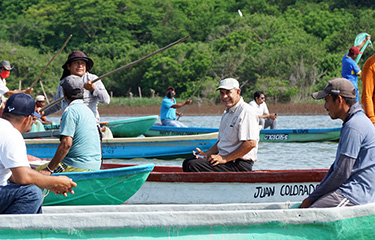The Smartfish Group, a hybrid social enterprise comprised of seafood trading company Comercializadora HealthyFish and SmartFish NGO, a nonprofit dedicated to improving the life quality of fisherman while taking care of ocean ecosystems, recently released a report reviewing the progress it has made in its mission since it was founded in 2015.
Smartfish offers Mexican fishing cooperatives an option to sell their products into better-paying market segments. Cooperatives whose products meet strict environmental, social, and quality criteria may sell them through Comercializadora Smartfish, but cooperatives have the freedom to sell to any buyer they wish.
“Over the past three years, we’ve worked on refining the model and putting in place systems to support the fisher cooperatives more efficiently,” SmartFish Rescate de Valor Executive Director Cecilia Blasco said.
Smartfish’s unique model, recently recognized by the U.N. as an ocean innovator, an honor that came with a USD 250,000 (EUR 250,000) of support, is intended to address a major challenge for engaging non-industrial producers – how to build a mechanism that begins with the producers and their community needs and leverages market access to drive improved social and environmental practices.
Over the past three years, Smartfish has been involved in engaging numerous Mexican fisheries and cooperatives, including the yellowtail amberjack fishery in Guaymas Sonora; the snook fishery in Marismas Nacionales, Nayarit; the launch of a finfish initiative in El Rosario, Baja California; the development of finfish scoping and assessments in the Yucatán; and a skipjack tuna-scoping project and assessment in Puerto Ángel, Oaxaca, all accomplished despite the difficulty of working during the global COVID-19 pandemic.
Smartfish’s “bottom-up” approach ensures its approach to fishery improvement projects is implemented in a way tailored to capture the opportunities and address the challenges associated with particular to each individual fishery or community. It also allows for the implementation of a program that goes beyond criteria dictated by the marketplace, ensuring a quality sustainable product is delivered to market.
“In most cases, fishers bear a disproportionate share of the costs of improving sustainability. By incorporating market access and value addition goals into the fishery improvement projects, we are compensating the fishers’ opportunity costs and creating jobs in coastal communities,” Blasco said.
Smartfish’s Value Rescue Program is an example of how working with producers and communities creates value and durability in producers’ access to market, but also increases and improves the seafood being delivered to market, Blasco said. According to Blasco, the program helps producers by recovering the value fishing cooperatives waste during the catch, post-catch handling, logistics, and management by engaging in practices aimed at improving quality, reducing waste, and optimizing business processes; improving the fishing cooperative’s value retention through a combination of disintermediation and business efficiencies; and encouraging improvements in fishery management. This allows the participating cooperatives to deliver to the marketplace a high-quality, food safety certified seafood that is independently verifiable as environmentally sustainable and socially responsible, Blasco said.
“The skipjack from Oaxaca is a great example of the value rescue model at work,” Blasco said. “Although skipjack is prized in many cuisines, it has a delicate meat and has to be well-handled and properly refrigerated to conserve its qualities. The skipjack harvested in by small-scale fishers in Oaxaca fetches as little as USD 1.00 [EUR 1.00] per kilo and is destined for bait or smoked and dried. SmartFish is working with local cooperatives to improve the post-harvest handing and build a small processing facility to freeze and vacuum-pack their catch. The landing price for participating fishers will more than double.”
Photo courtesy of SmartFish Rescate de Valor







